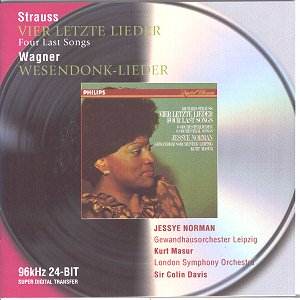STRAUSS/WAGNER
Four Last Songs/Wesendonck
Lieder
 Norman/Concertgebouw/Masur/LSO/Davis
Norman/Concertgebouw/Masur/LSO/Davis
Recorded 1975/1983
50 Great Recordings
 PHILIPS 464 742-2
[47.41]
PHILIPS 464 742-2
[47.41]
Crotchet AmazonUK
AmazonUS

Somehow Jessye Norman's singing has always been, at least in this reviewer's
opinion, mannered and rather precious, but over the years these performances
have proved to be quite the reverse. In fact Strauss is the one composer
in which she excels (one thinks of her exemplary portrayal of Ariadne). Despite
the enormity (no pun intended) of sound she can summon up, she can also
miniaturize her voice and coat it with the most sublime of subtle phrasing,
whilst her pianissimo in these songs is perfectly controlled. She is more
than a match for Schwarzkopf whose famous recording has always reigned supreme.
Masur's strictly disciplined control of (at the time of the recording in
1982) his Gewandhaus Orchestra produces some heavenly playing, not only from
the leader and principal horn, but also the full band. The result is a
performance one can bask in from the Indian summer of Strauss's amazing music,
the apotheosis of Romanticism penned by a man approaching death in his eighties,
whose last sounds to us are two ascending lark-like flutes as life draws
to a close. Flagstad was an early interpreter of Strauss's Four Last Songs
(she sang the British premiere of them at London's Royal Albert Hall
under Furtwängler nine months after the composer's death in 1949) so
it comes as no surprise that if this Wagnerian par excellence could sing
them, so can Jessye Norman with her majestic sound.
Wagner's Wesendonck Lieder were written for his mistress Mathilde
Wesendonck in 1857/58 when he was preoccupied with the ultimate expression
of love and eroticism in music, his opera Tristan und Isolde. There
may be doubt in the minds of some as to whether it was a consummated
relationship, but no matter for the music really tells it all. Norman makes
the most of her dark-hued mezzo register from the outset in this 1975 recording.
The LSO are under Colin Davis using Felix Mottl's orchestration of the five
songs. Her account of 'Stehe still!' (the second song) is probably the finest
example of the sheer variety of tonal colour and power which she can produce,
riding the orchestral climax with consummate ease, whilst the first of the
so-called studies for Tristan, 'Im Treibhaus' (the third song) depends
on sustaining its tension. Norman's ability to place the notes in head voice
is a revelation. 'Schmerzen' is an operatic outburst, often threatening to
divert into Götterdämmerung, and Norman exploits
its drama to the full, whilst the final 'Träume' is appropriately dreamy
as they (the dreams) 'sink into the grave'.
You might feel that, coming in at just about 48 minutes, you are not getting
much for your money, but to that one would respond by saying that the old
adage that it's quality and not quantity that counts could not be more true.
Leaving aside all the silliness going on at present as record companies and
the BBC vie with each other to produce the best of this and the best of that,
50 finest performances of this and so many Legends of that, Jessye Norman's
singing of Strauss's Four Last Songs is a must for anyone's collection.
Christopher Fifield

